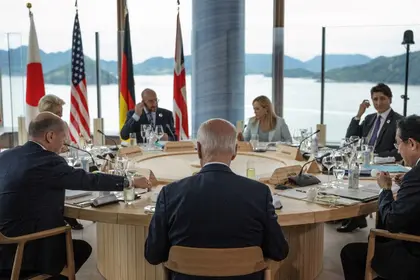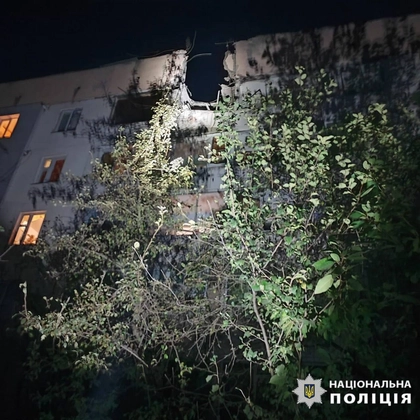World leaders attending the G7 summit in Japan have announced new sanctions on Friday that they said would "starve Russia of G7 technology, industrial equipment and services that support its war machine."
JOIN US ON TELEGRAM
Follow our coverage of the war on the @Kyivpost_official.
The move comes after the United States, Britain and the European Union all announced fresh efforts to turn the screws on Moscow, 15 months into Vladimir Putin's full-scale invasion of Ukraine.
The bloc, meeting in the Japanese city of Hiroshima, said that they would move to further restrict Russia's access to G7 economies.
"We will broaden our actions to ensure that exports of all items critical to Russia's aggression... are restricted across all our jurisdictions," they said in a statement. "
We will starve Russia of G7 technology, industrial equipment and services that support its war machine," added the bloc, which includes Britain, the United States, Japan, Canada, Germany, France, Italy and the European Union.
The grouping said they would step up efforts to prevent circumvention of their existing sanctions regime, "including targeting entities transporting material to the front."
President Zelensky will attend the G7 summit in Japan in person, a source close to the matter in Hiroshima told AFP on Friday morning. There were no immediate details on when the Ukrainian leader would arrive, though he had previously been expected to address G7 leaders by video conference on Sunday.

South Korea Demands 'Immediate Withdrawal' of North Korean Troops in Russia
Blacklist for 70 Companies
Earlier, a US official who spoke anonymously to AP and other media outlets, said the US component of the sanctions package to be put to the G7 will: “blacklist about 70 Russian and third-country entities involved in Russia’s defense production, and sanction more than 300 individuals, entities, aircraft and vessels.”
The official added that the other G7 nations would be asked to undertake similar steps to further isolate Russia and to undermine its ability to wage war in Ukraine.
The official is reported to have said that the G7’s latest efforts will be “aimed at disrupting Russia’s ability to get materiel it needs for the battlefield, close loopholes used to evade sanctions, further reduce international reliance on Russian energy, and narrow Moscow’s access to the international financial system.”
One example cited by an EU official speaking to The Guardian yesterday is Russia’s multi-billion-dollar diamond industry.
“We believe we need to limit exports from Russian trade in this sector,” the official said, adding that Indian involvement would be crucial to making any new measures work.
India, which is officially neutral about the war on Ukraine but will be attending the G7 Summit as an invited guest, accounts for a large portion of the world’s trade in rough diamonds.
“We would like to engage in a dialogue with them, because the diamond industry is quite important in India,” the official said.
Common Ground on Russia and China?
Experts who spoke to media outlet AFR said the summit’s biggest challenges would be finding consensus on more effective sanctions against Russia and agreeing on how to deal with China without compromising their economic relationships with Beijing.
All the G7 countries – the United States, Japan, Germany, the United Kingdom, France, Canada and Italy, as well as the EU – are strong allies of Ukraine and have vital economic ties to China, which has grown its trade with Russia by nearly 30 percent during the full-scale invasion period.
In addition to India, leaders from Australia, Brazil, Indonesia and South Korea are also among invited guests – in an apparent attempt to further isolate Russia and potentially send a message to China.
Sanctions – Do They Work?
Russia is now the most-sanctioned country in the world, but there are questions about the effectiveness of the financial penalties.
As reported by AP, the United States has frozen Russian Central Bank funds, restricted banks’ access to SWIFT – the dominant system for global financial transactions – and sanctioned thousands of Russian firms, government officials, oligarchs and their families.
AP further reports that the Group of Seven nations collectively imposed a $60 per-barrel price cap on Russian oil and diesel last year, which the US Treasury Department yesterday defended in a new progress report, stating that the cap has been successful in suppressing Russian oil revenues.
That report cited Russian Ministry of Finance data showing that the Kremlin’s oil revenues from January to March this year were more than 40 percent lower than last year.
However, as reported by Al Jazeera, a study released by the Kyiv School of Economics last month found that 96 percent of oil shipments from the Russian port of Kozmino during the first quarter of 2023 were sold above the $60 oil price cap set by the G7 last year.
Such tactics, as well as increased trade with China, India and Turkey in particular, may be contributing to the fact that the Russian economy has nevertheless grown by 2.2 percent in 2022.
“There is definitely plenty of space for the G7 to impose further restrictions and tighten the existing ones,” Rachel Lukasz, a member of the International Working Group on Russian Sanctions at Stanford University, whose advice the Ukrainian government has used, told Al Jazeera.
“The most important areas include oil and energy more broadly, non-energy trade sanctions and closing loopholes in this area, and technology sanctions,” she said.
The economic impact of sanctions, as reported by AP, depends largely on the extent to which a targeted country is able to circumvent them, according to a recent Congressional Research Service report. US Treasury officials recently have travelled across Europe and Central Asia to press countries that still do business with the Kremlin to cut their financial ties.
“Record High” in Russia/China Trade
Against this background, G7 officials could be concerned that Russian/Chinese economic ties have grown to a “record high” during the full-scale invasion of Ukraine.
An analysis based on Chinese trade figures – released on May 8 by thinktank Atlantic Council – found that:
· Total bilateral goods trade rose 29 percent in 2022, reaching a record high despite Russia’s recession –Chinese imports and exports provide critical economic assistance to Moscow, quelling inflation by reducing shortages and ensuring businesses can stay open.
· Chinese crude imports from Russia rose 8 percent in 2022 from the year prior – Chinese imports support the Russian budget and limit crude oil well shut-ins, which are expensive and highly damaging for long-term output.
· China directly exported $179 million of integrated semi-conductor circuits to Russia in 2022, more than double its 2021 shipments with even more exports occurring indirectly via third-party countries – China’s direct and indirect provision of chips sustains Russian armaments production lines.
· China’s December 2022 truck shipments rose 1,143 percent year-on-year –Chinese exports of super-heavy civilian trucks limit wartime inflation and indirectly bolster Russian armed forces operations.
· Seventy Chinese exporters sold 26 distinct brands to Russia - Chinese drones are providing important intelligence information to Russian armed forces on the front lines.
“Jet Coalition”
Beyond the sanctions discussion, Zelensky is likely to raise his proposal for an international “jet coalition” to strengthen Ukraine’s air defenses, as he did during his recent tour of western European capitals and to the Council of Europe summit last week.
The “coalition” now has the support of the UK, the Netherlands, France, Belgium, Poland and Slovakia, especially for pilot training, but no country has publicly committed to providing the 40 to 60 F-16s requested by Ukraine.
You can also highlight the text and press Ctrl + Enter






